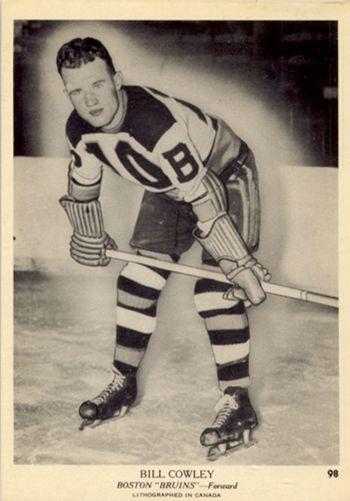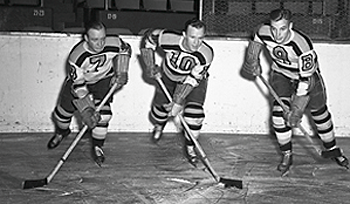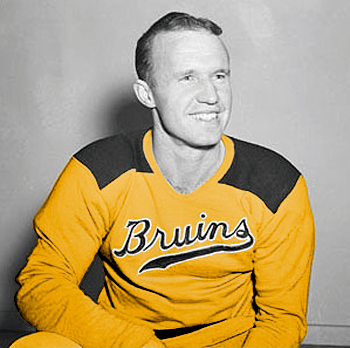Bill Cowley won the scoring title in the Maritime Senior Hockey League in 1934 with 50 points in 28 games while playing for the Halifax Wolverines, giving notice as to what was to follow in the years to come.
Cowley then began his NHL career with the St. Louis Eagles during their one and only season after relocating from Ottawa. Following the demise of the Eagles, Cowley was claimed in a dispersal draft of the former St. Louis players by the Boston Bruins. Originally used as a left wing, Cowley was moved to center to take full advantage of his excellent play making abilities.
Beginning in the 1935-36 season, Cowley's point totals began a steady climb during the first four seasons of his career, first from 21 points to a team leading 35 followed by 39 points in a then 48 game season. Although limited to 34 games by injury, Cowley exceeded a point-per-game average in 1938-39 with 8 goals and 34 assists for 42 points in just 34 games to finish third overall in league scoring. He continued this pace in the playoffs with 14 points in 12 games as the Bruins won the 1939 Stanley Cup in five games over the Toronto Maple Leafs.
1939 OPC Bill Cowley hockey card
He again reached the 40 point mark the following year, but his streak of being the Bruins leading scorer ended at three. In 1940-41, Cowley then led not only the Bruins in scoring, but the entire NHL while setting a new league record of 62 points. Cowley's 45 assists alone were enough to win the scoring race, as his final point total was 40% more than his nearest challengers 44 points. While Cowley would only compete in two post-season games that season, the Bruins would win their second Stanley Cup in three seasons. At the conclusion of the season, Cowley was named the winner of the Hart Trophy.
After a short 28 game season in 1941-42, a healthy Cowley returned in 1942-43 to again lead the Bruins in scoring and set a new personal best in the process with 27 goals and 45 assists for 72 points, just one behind Chicago's Doug Bentley's new league record of 73 points. 8 more points followed in 9 playoff games as the Bruins again returned to the Stanley Cup Finals and Cowley was awarded his second Hart Trophy.
In 1943-44 Cowely had what would have been the most remarkable seasons in NHL history up to that point turn into a virtually forgotten footnote instantaneously. Cowley, who was on pace to shatter the league scoring record with 95 points, had reached 71 points and was averaging an amazing 1.97 points per game when an injury ended his season with 12 games remaining, which at the time was 25% of the schedule. Despite being limited to 36 games, Cowley's 30 goals that season would prove to be a career high.
Bill Cowley #10, centering a line for the Bruins
He returned with 65 points to lead the Bruins in scoring for the sixth time in 1944-45. He only completed in 26 games in 1945-46, but was healthy in time for the playoffs as the Bruins made another appearance in the finals.
His final NHL season, his 12th with the Bruins, saw him score 38 points, which included scoring a goal and an assist on this date in 1947 to become the NHL's all-time leading scorer with 529 points to pass Syd Howe's previous record.
He would retire following the season, having now raised his record to 548 points, which he scored in 549 games. He was also the last active player from the St. Louis Eagles roster.
Cowley was inducted into the Hockey Hall of Fame in 1968, the only Hall of Famer to begin his career with the St. Louis Eagles.
Today's featured jersey is a 1940-41 Boston Bruins Bill Cowley jersey from the season Cowley set a new league record with 62 points while winning the scoring title. The Bruins introduced this gold alternate jersey, as opposed to a full time road jersey, in 1940-41 and went on to win the Stanley Cup with a four game sweep of the Detroit Red Wings that year.
This gold jersey was worn for four seasons until being retired after the 1943-44 season. Prior to the introduction of today's jersey, the Bruins wore a single jersey style for both home and road games all season long, dating back to their first season of 1924-25.














No comments:
Post a Comment
We welcome and encourage genuine comments and corrections from our readers. Please no spam. It will not be approved and never seen.